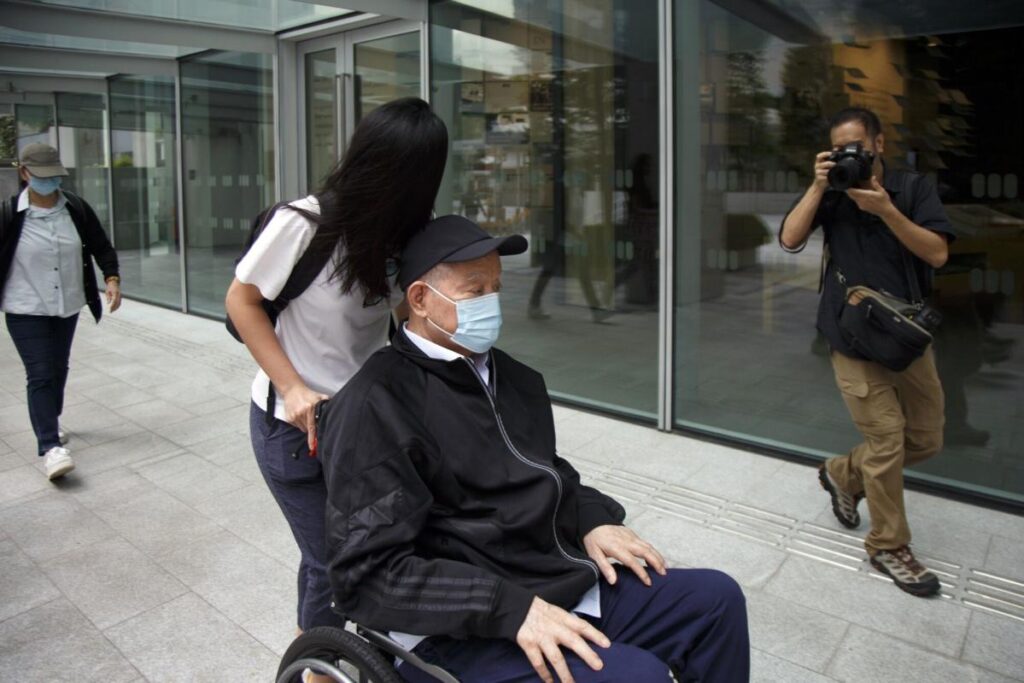(Bloomberg) — A Singapore court has sentenced oil tycoon Lim Oon Kuin to 17-and-half years in jail for cheating HSBC Holdings Plc and instigating forgery, in a case that has shaken the city-state’s commodity-trading community.
Most Read from Bloomberg
The 82-year-old founder of Hin Leong Trading Pte., who has appeared for court hearings in a wheelchair, faced three out of more than 100 charges initially presented. Lim and his children had already agreed in September to pay $3.6 billion to the company’s liquidators and creditor HSBC in a separate, civil, case, and have filed for bankruptcy.
Judge Toh Han Li said during the sentencing at Singapore’s State Courts on Monday that a “deterrent” sentence was justified and said there would be no major concessions for Lim’s medical condition. Lim, a Mandarin speaker with limited English, listened to the sentencing through a translator.
His lawyer Davinder Singh, a top litigator whose clients have included the nation’s first prime minister, Lee Kuan Yew, has appealed on behalf of his client. Lim will not begin to serve his sentence until after the appeal hearing.
OK Lim, as he is widely known, built up his company from a one-truck operation into a family-held powerhouse. Traders, analysts and lawyers interviewed by Bloomberg described a young immigrant whose grit and business acumen were as notable as his iron fist in the early years, expanding along with the country’s profile as a commodity trading hub.
Hin Leong, at its peak, traded a range of oil products, made lubricants and operated loading terminals and storage facilities. Its affiliate had a fleet of more than 100 ships transporting fuel across the world.
But when Lim’s downfall came in 2020, as Covid—19 sent oil prices into freefall, it was swift. A bad bet that China’s swift containment of the coronavirus would turn the crude market around exposed $800 million of hidden futures losses. Other practices later uncovered included using single cargoes to obtain multiple loans. While the company’s official paperwork pointed to an annual profit, it had in reality been operating in the red for years, he said at the time.
It was a shocking demise for the industry and for Singapore, still recovering from other trading and accounting scandals including Noble Group Ltd, Agritrade International Pte., ZenRock Commodities Trading Pte. and Hontop Energy (Singapore) Pte. Ltd., that threatened the nation’s squeaky-clean reputation.
Risk Taker
Born in China’s Fujian province, Lim started as a small wholesaler of fuel to local transport companies and fishing boats. He would go on to leverage his strength in logistics to build a regional distribution network serving frontier Asian markets such as Vietnam and later, Myanmar.
Interviews with those who knew Lim at his peak, most of whom declined to be named given the sensitivity of the topic, paint a picture of a low-key figure, with a rags-to-riches path that led to wealth he generally preferred not to flaunt. In his own testimony, he described his upbringing as the son of a fisherman, working odd jobs to make ends meet before joining the suppliers that sold fuel for the family boat.
But the oil trading heavyweight was also a keen poker player and risk taker, and he made the most of the opacity of the oil trading world. His trades, bold and aggressive, became legendary.
“OK Lim was a pioneer in Singapore and Asia’s oil-trading industry, and a success story,” said John Driscoll, a veteran Singapore-based trader who traded alongside Lim in the 1990s and 2000s.
“While he has to face up to his wrongdoings and the collapse of his company, it doesn’t take away from the man’s legacy and the rags-to-riches story of what was once the country’s leading oil merchant.”
Hin Leong got its break in the 1990s, when Lim and his son, Evan Lim, began participating in a trading and price assessment platform run by what’s now known as S&P Global. As part of this mechanism, market players submit bids and offers for small parcels of oil that will go into determining the cost of fuel at hubs such as Singapore. They also provide physical deliveries for transactions on the so-called market-on-close (MOC) window.
Before long, Hin Leong became an active player, dominating regional diesel and fuel oil markets as his company expanded to include the ownership of onshore storage tanks and a fleet of tankers doubling up as floating storage, from which large volumes could be delivered.
As China expanded and ships stopped in Singapore for fuel, Hin Leong was there to supply it.
The hidden losses and ultimate collapse of the company, first reported by Bloomberg in 2020, brought all of that to a halt. He was convicted in May this year and has since presented himself as a much-diminished figure.
OK Lim and his family’s assets, including some of Singapore’s most valuable houses in prestigious districts, have been up for sale. Proceeds will go to the judicial managers of Hin Leong.
(Writes through with additional detail, comments and background from paragraph 2)
Most Read from Bloomberg Businessweek
©2024 Bloomberg L.P.
Read the full article here


